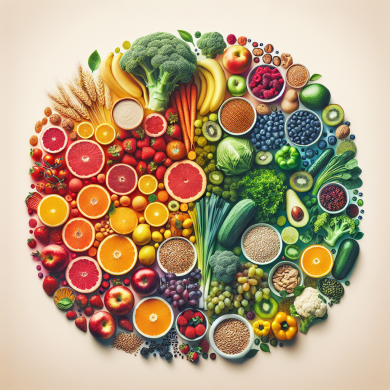Clean Eating: Boost Digestive Health Naturally
### Introduction
In today’s fast-paced world, maintaining optimal digestive health is more crucial than ever. Digestive health is essential not only for nutrient absorption but also for overall wellness and disease prevention. One of the most effective ways to foster digestive health is through clean eating. This article delves into clean eating principles and their role in boosting digestive health naturally.
### Understanding Clean Eating
Clean eating is not a diet; it’s a lifestyle approach to food and its preparation. It focuses on consuming whole, minimally processed foods as close to their natural state as possible. This means prioritizing fresh fruits, vegetables, lean proteins, whole grains, and healthy fats while avoiding refined sugars, artificial ingredients, and overly processed foods.
### The Connection Between Clean Eating and Digestive Health
Digestive health depends significantly on the quality of the food consumed. Nutrient-rich, whole foods support the gut microbiome, which plays a vital role in digestion and immune function. Clean eating encourages the consumption of fiber-rich foods, probiotics, and prebiotics, all of which contribute to a healthy gut environment.
### Fiber: The Digestive Health Powerhouse
Fiber is crucial for maintaining healthy digestion. It aids in regular bowel movements, prevents constipation, and supports a healthy gut microbiota. There are two types of fiber: soluble and insoluble. Soluble fiber dissolves in water to form a gel-like substance, which helps regulate blood sugar and cholesterol levels. Insoluble fiber adds bulk to stools and aids their passage through the digestive tract.
**Sources of Soluble Fiber:**
– Oats
– Apples
– Citrus fruits
– Carrots
– Barley
**Sources of Insoluble Fiber:**
– Whole grains
– Nuts
– Seeds
– Vegetables like broccoli and spinach
### The Role of Probiotics in Digestive Health
Probiotics are live microorganisms that provide numerous health benefits, particularly for the digestive system. They help balance the gut microbiome, which can be disrupted by poor diet, stress, or antibiotics. A balanced microbiome is essential for effective digestion, nutrient absorption, and immune function.
**Sources of Probiotics:**
– Yogurt with live cultures
– Kefir
– Sauerkraut
– Kimchi
– Miso
– Tempeh
### Prebiotics: Feeding the Good Bacteria
Prebiotics are non-digestible fibers that serve as food for probiotics, helping them thrive in the gut. Incorporating prebiotic-rich foods into your diet supports a healthy gut microbiome, which is essential for digestion and overall health.
**Sources of Prebiotics:**
– Garlic
– Onions
– Asparagus
– Bananas
– Chicory root
– Jerusalem artichokes
### Hydration: An Essential Component of Digestive Health
Adequate hydration is often overlooked in discussions about digestive health, yet it plays a crucial role. Water helps break down food for easier passage through the digestive tract and prevents constipation by softening stools. For optimal digestive health, aim to drink at least 8-10 glasses of water daily.
### Healthy Fats and Their Digestive Benefits
Healthy fats are essential for nutrient absorption, hormone production, and maintaining cell membrane integrity. They also play a role in promoting digestive health by reducing inflammation and enhancing gut motility.
**Sources of Healthy Fats:**
– Avocados
– Nuts and seeds
– Olive oil
– Fatty fish like salmon and mackerel
– Coconut oil
### Avoiding Common Digestive Offenders
While clean eating focuses on the inclusion of wholesome foods, it’s equally important to avoid or limit foods that can harm digestive health. Highly processed foods, artificial sweeteners, and excessive sugar can disrupt gut flora and lead to digestive issues.
**Foods to Limit or Avoid:**
– Processed snacks and fast foods
– Sugary drinks and sweets
– Artificial sweeteners
– Excessive alcohol
– Refined grains
### Mindful Eating: The Psychological Aspect of Digestive Health
Mindful eating is a practice that involves paying full attention to the experience of eating and drinking, both physically and emotionally. It encourages slower eating, which aids digestion by allowing time for the body to signal when it’s full, reducing the likelihood of overeating.
**Tips for Mindful Eating:**
– Eat slowly and chew thoroughly.
– Focus on the flavors, textures, and aromas of your food.
– Eliminate distractions during meals, such as TV or smartphones.
– Listen to your body’s hunger and satiety cues.
### Sample One-Day Clean Eating Meal Plan for Digestive Health
**Breakfast:**
– Overnight oats topped with fresh berries and a sprinkle of chia seeds.
– A glass of water with a squeeze of lemon.
**Lunch:**
– Grilled chicken salad with mixed greens, cherry tomatoes, cucumbers, and olive oil vinaigrette.
– A side of whole-grain bread.
**Snack:**
– A small handful of almonds and an apple.
**Dinner:**
– Baked salmon with a side of quinoa and steamed broccoli.
– A bowl of mixed fruit for dessert.
**Hydration:**
– Herbal tea or water throughout the day.
### Conclusion
Clean eating is a powerful tool for enhancing digestive health naturally. By focusing on whole, nutrient-rich foods and avoiding processed items, you can support your gut microbiome, improve nutrient absorption, and promote overall well-being. Incorporating fiber, probiotics, prebiotics, and healthy fats, alongside maintaining proper hydration and practicing mindful eating, can lead to significant improvements in digestive health. Embrace clean eating as a lifestyle choice to enjoy a healthier, more balanced life.















Add comment